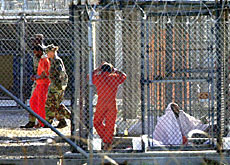US fails to answer ICRC concerns

The International Committee of the Red Cross (ICRC) says it sees “no substantial progress” from the Bush administration on the fate of prisoners held at Guantanamo Bay.
After two days of talks in Washington, the ICRC said the United States had only agreed to accelerate the review process of detainees in line for a possible release.
The ICRC delegation, headed by the organisation’s president, Jakob Kellenberger, met on Thursday and Friday the US secretary of state, Colin Powell, the national security advisor, Condoleezza Rice, and the deputy secretary of defence, Paul Wolfowitz.
The discussions dealt with the fate of the prisoners who have arrived since January 11, 2002 at Guantanamo, the military base that the United States maintains on the island of Cuba.
Kellenberger and his team had already drawn various issues to the attention of the same officials during similar talks last May. But, as during the first visit, the delegation was unable to get any concrete undertaking from the US government.
Illegal combattants
In a communiqué released at the end of its visit in Washington, the ICRC delegation “lamented the fact that two years after the first detainees arrived at Guantanamo, and despite repeated pleas, they are still facing seemingly indefinite detention beyond the reach of the law”.
Kellenberger also noted that his “concerns” about conditions and treatment in Guantanamo “have not yet been adequately addressed”.
The communiqué added that his concerns had gone from bad to worse because “beyond Guantanamo, the ICRC is increasingly concerned about the fate of an unknown number of people captured as part of the so-called global war on terror and held in undisclosed locations”.
Béatrice Mégévand-Roggo, the ICRC’s general delegate for Europe and the Americas, told the media that the US had made “no substantial progress” in its attitude toward the individuals captured in Afghanistan and elsewhere since the US began its offensive on terrorism in 2001.
Two years after the opening of the prison at Guantanamo, only a few detainees – children and elderly people for the most part – have been freed, and 660 men and boys suspected of belonging to the Taliban or the al-Qaeda network are still there.
The US government views these prisoners as “illegal combatants”, refusing to grant them prisoner of war status. This means Washington can deny them the rights and protection provided under the Geneva Conventions.
Accelerated review process
The ICRC is not the only human rights organisation to call on the Bush administration to apply the Conventions, and either to put on trial or release the detainees.
In the United States, New York-based Human Rights Watch charges that the White House is keeping the Guantanamo prisoners in “a legal black hole”.
The ICRC said, however, that it has received “assurances from the US authorities that the review process in place is to be accelerated, leading to possible further releases from Guantanamo”.
On Friday, the Pentagon discreetly announced that it was about to release three teenagers aged 13 to 15.
This announcement coincided with the visit of the delegation in Washington, but neither the Bush administration nor the ICRC would confirm these upcoming releases were a result of their talks.
swissinfo, Marie-Christine Bonzom in Washington
This is the second time an ICRC delegation has discussed with the Bush administration the status of the Guantanamo detainees.
Despite being held in Cuba as part of the United States “war on terror”, the detainees have not been granted prisoner of war status, denying them rights and protection under the Geneva Conventions.
So far, 84 boys and men have been released from the camp, but 660 others are still detained there.
During its latest talks, the ICRC only won assurances that the review process for the release of the prisoners would be speeded up.

In compliance with the JTI standards
More: SWI swissinfo.ch certified by the Journalism Trust Initiative












You can find an overview of ongoing debates with our journalists here . Please join us!
If you want to start a conversation about a topic raised in this article or want to report factual errors, email us at english@swissinfo.ch.